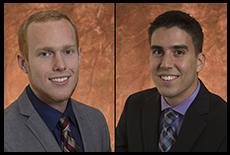Students create walking challenge for longevity


Two first-year College of Medicine students challenged fellow students, faculty and staff members to a walking competition called New Habit November. Mark Kastner and Mark Matechik wanted to help participants who have sedentary lifestyles begin an exercise habit easily incorporated into a school or work day.
“A lot of people think of lifting at the gym or running a marathon,” said Matechik. “You don’t need to do something huge to become healthier.”
Both students hold undergraduate degrees in exercise science from FSU and had the idea for a walking challenge independently. They combined forces upon learning of their mutual interest.
For Kastner, inspiration came from personal experience.
“I noticed that I wasn’t walking much anymore,” he said. “Studying a lot over the summer kept me really sedentary, and I didn’t like it. I wanted to get back into walking.”
Matechik got the idea from a former employer.
“I was a health coach with Campus Recreation previously,” he said. “I worked with April Moore, who is in charge of the Fitness and Movement Clinic. She had done a similar challenge with another department, so she just handed me everything we needed and was always there as support for us.”
New Habit November (Nov. 18-Dec. 16) was made up of 24 teams of four with names like “The Walking Dead” and “Agony of DeFeet.” Half were student teams, and half were faculty/staff. Each participant used a pedometer to count steps.
"I reached out to one of our old professors, Dr. Lynn Panton,” said Kastner. “She gave us 20 pedometers for free – the fancy research pedometers. That was super helpful.”
Matechik and Kastner collected each participant’s steps daily. Together, all participants took 17,084,690 steps, the equivalent of walking 8,542 miles. That’s the distance from Tallahassee to Portugal and back.
The two students hope the challenge is the beginning of developing a habit for a healthier life.
“For someone who is sedentary a lot of the day, getting their heart rate up for just a little bit is beneficial,” said Kastner. “I saw a faculty member and a staff member walking around the herb garden one day, and they said, ‘We’re just trying to get our steps in.’ I was so happy; I was actually seeing people walking because of the challenge.”
The students received much positive feedback after the challenge.
“A lot of participants have said things like, ‘I’ve noticed that I’ve been walking more’; ‘My team has been walking more’; ‘I have a lot more energy’; ‘I’ve just been doing more,’” said Matechik. “They’re very happy.”
They plan to do it again.
“Next year,” Kastner said, “we’re going to get some first-year students to help us.”
Both hope this year’s participants see how incorporating small exercise efforts adds up to long-term benefits.
“If you just make that tiny effort to get up out of your desk, walk around for five minutes every hour and sit down, that keeps your heart moving enough that you actually see health benefits very quickly,” said Matechik. “It’s the little things that you don’t realize you’re doing that can actually benefit you a lot in the long run.”

